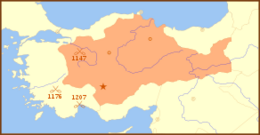More languages
More actions
| Sultanate of Rum Anadolu Selçuklu Devleti | |
|---|---|
| 1075-1308 | |
|
Flag | |
 The Sultanate of Rum in 1190 | |
| Capital | Iconium (1096-1308) |
| Official languages | Turkish (people) Persian (bureucracy) |
| Religion | Islam |
| Dominant mode of production | Feudalism |
| Government | Monarchy |
The Sultanate of Rum was a feudal Sunni Muslim state existed between 1075 and 1308. It was founded by Suleiman ibn Qutalmish and his brothers who invaded Central Anatolia after the Great Seljuk ruler Alparslan, who emerged victorious from the Battle of Manzikert, ordered his commanders to invade Anatolia. It is considered as the beginning of Turkish history in Anatolia.
History[edit | edit source]
Before the Mongol Invasion[edit | edit source]
Byzantine peasants did not resist against the Turks because of the taxes imposed by the former Byzantine aristocracy. Therefore, Suleiman freed the slaves working on the emperor's farms and taxed them only with money and commodity. Suleiman and his brothers distributed the lands they controlled among themselves in accordance with the Turkic state tradition. They made the cities their own and left the plains to the nomads. The Sultanate's rule revitalized Anatolia's economy and increased productivity.
The Sultanate did not fight the Crusades unless it was itself a target, thus the prestige of the Turks among Muslims went down.
The sultanate entered its golden age when Qayqubad I conquered some commercial port cities.
Turkmen tribes in Central Asia migrated to Anatolia in masses due to the Mongol pressure. Therefore, the Turkic population in Anatolia increased rapidly and the cultural structure of Anatolia was changing. With the arrival of the Turkmens, the local population of the region was Islamicized and Turkified.[1]
Mongol Invasion[edit | edit source]
After the Battle of Kösedağ, the Sultanate of Rum became a vassal state of the Mongols. The Mongols imposed arbitrary taxes on the population and various resistance movements began to gain strength in Anatolia. Many beys declared their independence and the Sultanate began to disintegrate. With the conquest of Konya by the Karaman Beylik, the Sultanate of Rum was completely annexed.[1]
Society[edit | edit source]
Shi'ism was predominant among the nomads who came from Central Asia, while Sunni Islam was predominant in the cities. This led to religious conflicts within the Sultanate.[1] The Alevi (A Shia sect in Anatolia) uprising led by Baba Ishāq, had many peasant supporters and almost overthrew the Sultan. The Shia-Sunni conflicts of this period remained even during the Ottoman period. Today, Alevis make up 5% of Turkey's population.
References[edit | edit source]
- ↑ 1.0 1.1 1.2 Ernest Werner (1966). Birth of a Great State : The Development Process of Ottoman Feudalism: 'Struggle on the Border and the Formation of the State From Manzikert to Konya' (pp. 41-42-43). [PDF] Berlin: The Alan Publishing.

